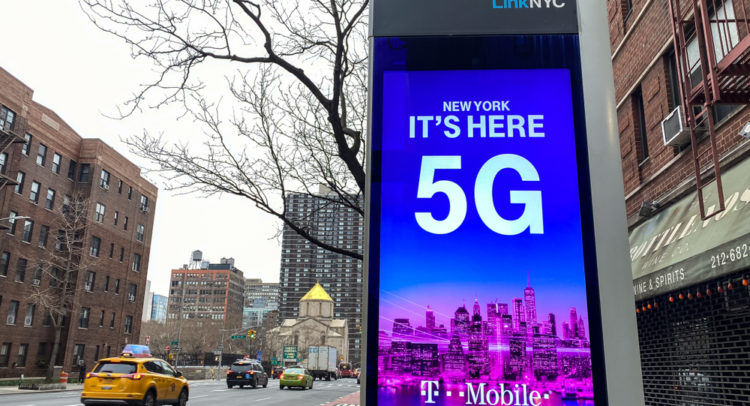T-Mobile has inked five-year, multi-billion-dollar agreements with both Ericsson and Nokia to help the mobile carrier accelerate and expand its 5G footprint.
Don't Miss Our New Year's Offers:
- Discover the latest stocks recommended by top Wall Street analysts, all in one place with Analyst Top Stocks
- Make smarter investments with weekly expert stock picks from the Smart Investor Newsletter
T-Mobile (TMUS) said that the deals are built on last year’s merger with Sprint, and will add more 5G coverage, capacity, speed and advanced technical capabilities such as 5G carrier aggregation across all of its spectrum bands. As part of the agreement, Ericsson will supply equipment, software, and related services, including active and passive antennas.
Furthermore, T-Mobile will use Nokia’s (NOK) AirScale radio platform to deploy an ultra capacity 5G layer with 2.5GHz massive MIMO technology. Under the new agreement, Nokia will also continue to expand T-Mobile’s extended range (low-band) 5G coverage.
“T-Mobile already has the largest 5G network in the country,” said Neville Ray, T-Mobile President of Technology. “These agreements with our longstanding 5G partners Nokia and Ericsson will help us take our 5G leadership even further, delivering ever-better experiences for our customers for years to come.”
T-Mobile said that the company is the first US provider to combine the power of extended range and ultra capacity 5G to boost speed and performance. Going forward, T-Mobile also intends to add advanced technical tools like voice over 5G (VoNR), network slicing, and multi-user massive MIMO to its 5G network.
The mobile carrier’s extended 5G range now covers 280 million people across almost 1.6 million square miles, which is more than two times the geographic coverage of AT&T and nearly four times more than Verizon.
Earlier this month, T-Mobile disclosed that the company surpassed its aggressive goal to cover 100 million Americans with ultra capacity 5G’s super-fast speeds by the end of 2020, reporting that 106 million Americans now have access to its 5G capabilities.
Following the report, Oppenheimer analyst Timothy Horan assigned a Buy rating on the stock with a price target of $160 (25% upside potential) as he expects “TMUS’s network quality to improve as it deploys more of Sprint’s 2.5GHz this year.”
“TMUS’s mid-band (2.5GHz) and mmWave spectrum is now deployed in more than 1K cities and covers 106M people, and this will double by the end of 2021 and give it a major competitive advantage,” Horan wrote in a note to investors. “Investors will focus on the first-quarter analyst day and potential start of stock buybacks by YE21, which are positives.” (See TMUS stock analysis on TipRanks)
Shares in TMUS are up about 1% in Thursday’s pre-market trading, with shares having gained a stellar 62% over the past year. Analysts have a bullish outlook on the stock with a Strong Buy Street consensus and average analyst price target of $147.44 (15% upside potential).

Related News:
Tesla Asked To Recall 158,000 Vehicles Due To Safety Concern; Shares Drop
Apogee Raises Quarterly Dividend By 7%; Shares Gain
IHS Markit’s 4Q Sales Lag Street Estimates



















